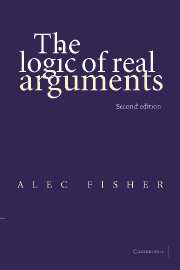Book contents
- Frontmatter
- Contents
- Preface to the first edition
- Preface to the second edition
- Acknowledgements
- 1 Introduction
- 2 A general method of argument analysis
- 3 A first example – from Thomas Malthus
- 4 Reasoning about nuclear deterrence
- 5 An example from John Stuart Mill
- 6 Arguments about God's existence
- 7 How do your mind and body interact?
- 8 Suppose for the sake of argument that …
- 9 An example from Karl Marx
- 10 Evaluating ‘scientific’ arguments. Some initial examples
- 11 Philosophical assumptions
- Appendix: Elementary formal logic
- Exercises
- Bibliography
- List of further reading
- Index
6 - Arguments about God's existence
Published online by Cambridge University Press: 05 June 2012
- Frontmatter
- Contents
- Preface to the first edition
- Preface to the second edition
- Acknowledgements
- 1 Introduction
- 2 A general method of argument analysis
- 3 A first example – from Thomas Malthus
- 4 Reasoning about nuclear deterrence
- 5 An example from John Stuart Mill
- 6 Arguments about God's existence
- 7 How do your mind and body interact?
- 8 Suppose for the sake of argument that …
- 9 An example from Karl Marx
- 10 Evaluating ‘scientific’ arguments. Some initial examples
- 11 Philosophical assumptions
- Appendix: Elementary formal logic
- Exercises
- Bibliography
- List of further reading
- Index
Summary
Does God exist? There are many fascinating arguments which relate to this subject and in this chapter we look at just two. We do this partly to give more examples which use our method of analysing and evaluating arguments, but also to see how the method copes with two distinctive kinds of argument – one rhetorical and one philosophical. We begin with a piece by Richard Dawkins called ‘The more you understand evolution, the more you move towards atheism’ and then we look at a piece by A. J. Ayer.
SECTION A: DAWKINS
Dawkins: ‘The more you understand evolution, the more you move towards atheism’
Dr Richard Dawkins is Professor of Public Understanding of Science at Oxford University. He is famous worldwide for his work in biology, especially as he explains it in a number of very readable books including The Selfish Gene, The Blind Watchmaker, River Out of Eden and several others. The following piece is an edited version of a speech he made at the Edinburgh International Science Festival on 15 April 1992. It is reprinted from the Independent newspaper with the permission of Dr Dawkins (paragraphs are labelled for ease of subsequent reference).
(a) As a Darwinian, something strikes me when I look at religion. Religion shows a pattern of heredity which I think is similar to genetic heredity. The vast majority of people have an allegiance to one particular religion. There are hundreds of different religious sects, and every religious person is loyal to just one of these.
[…]
- Type
- Chapter
- Information
- The Logic of Real Arguments , pp. 82 - 98Publisher: Cambridge University PressPrint publication year: 2004



